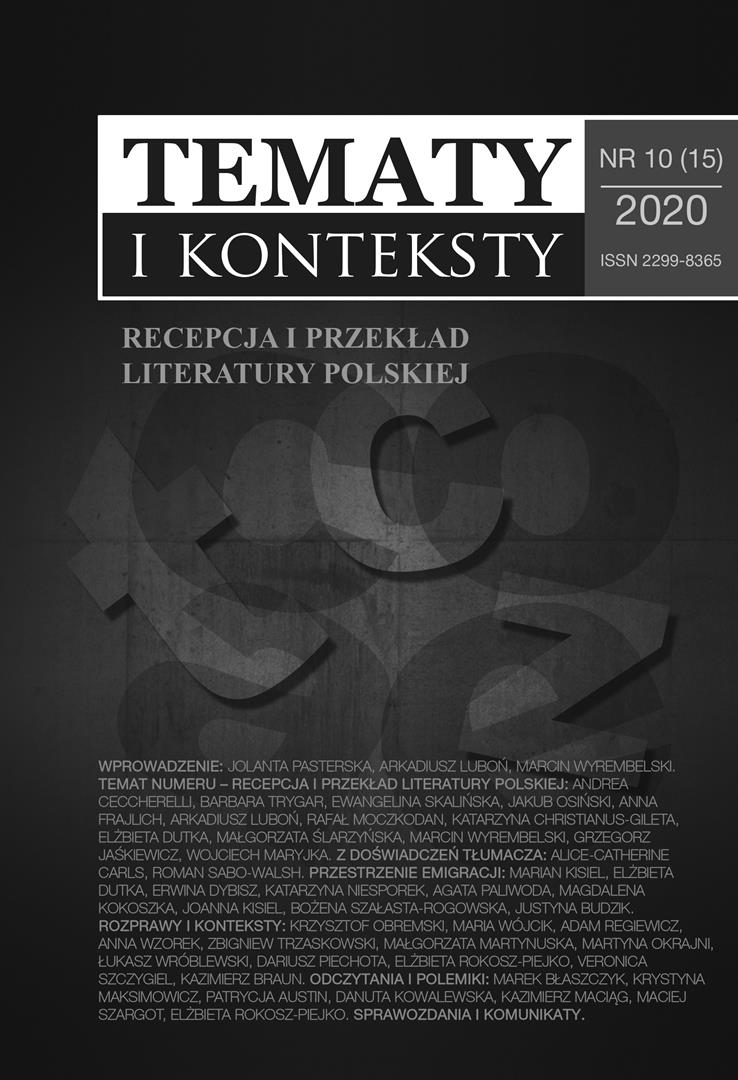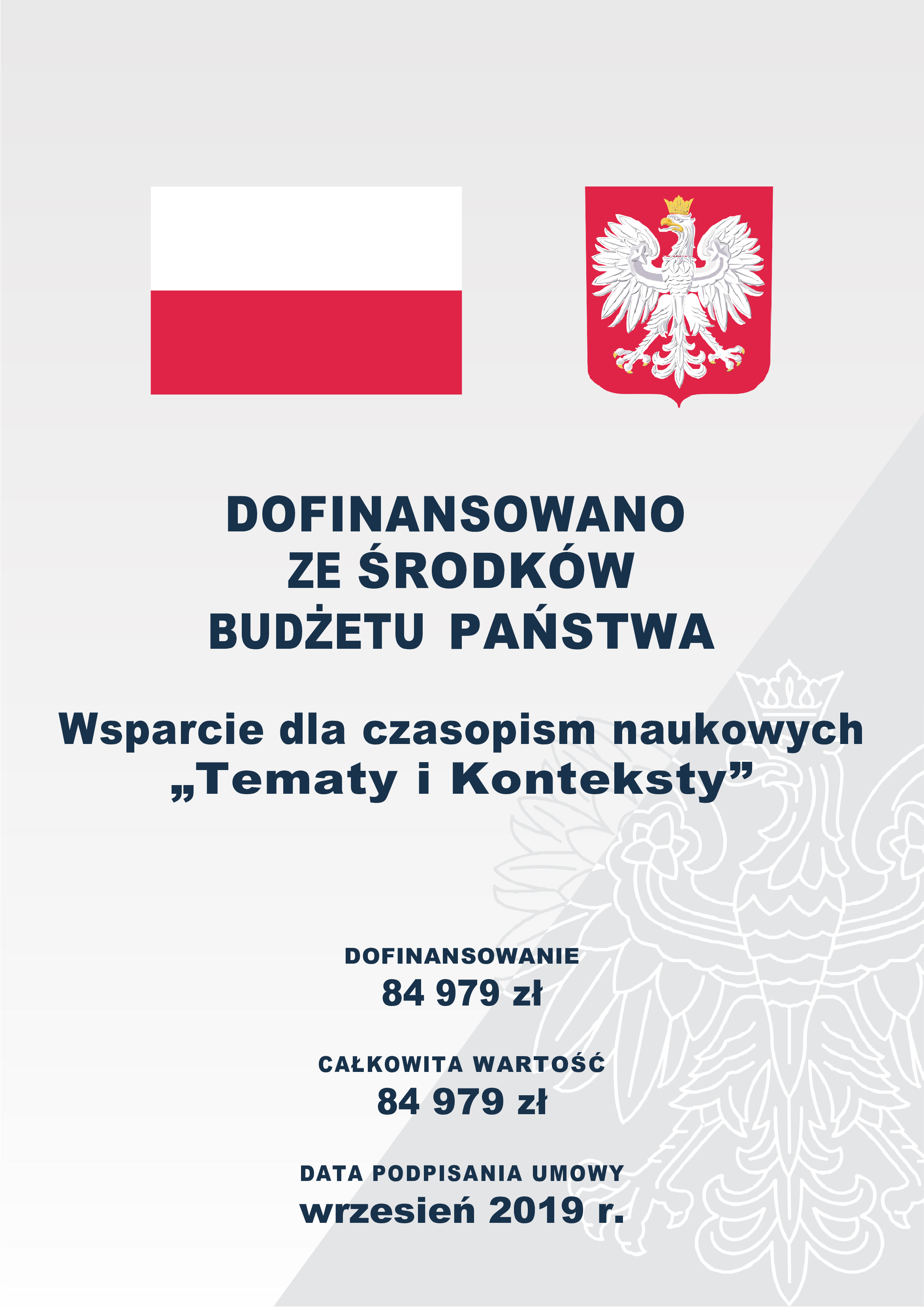‘Food Voice’: The Culinary Landscape in Cecilia M. Fernandez’s "Leaving Little Havana. A Memoir of Miami’s Cuban Ghetto"
DOI:
https://doi.org/10.15584/tik.2020.31Keywords:
memoir, culinary landscape, Cubans, hybrid identity, Little HavanaAbstract
The article discusses the ‘food voice’ as a substitute for verbal communication in the memoir Leaving Little Havana. A Memoir of Miami’s Cuban Ghetto by Cecilia M. Fernandez (2013). The culinary landscape of the memoir is examined through the anthropological perspective as the foodscape overlaps with the diasporic experience of the protagonists. Foodways show how Cuban identity is constructed in response to social and political developments. The geography of the memoir determines foodscapes by fusing Cuban cuisine with American regional cooking styles. The literary portrayal shows Cubans’ flexible attitude towards acculturation as their Floribbean cuisine maintains continuity with Caribbean cooking styles but, at the same time, it presents readiness to embrace new ingredients available in Florida. The emerging new food culture indicates the formation of complex hybrid identities.
Downloads
References
Anderson, E. N., Everyone Eats: Understanding Food and Culture, New York and London: New York University Press, 2005.
Appadurai, Arjun. How to Make a National Cuisine: Cookbooks in Contemporary India, “Comparative Studies in Society and Culture”, Vol. 30, No. 1, 1988, 3-24.
Ashley, Bob, Joanne Hollows, Steve Jones and Ben Taylor. Food and Cultural Studies, London and New York: Routledge, 2004.
Barthes, Roland. Toward a Psychology of Contemporary Food Consumption, [in:]Food and culture: A reader, ed. Carole Counihan and Penny Van Esterik, Third edition, New York and London: Routledge, 2013(1961), 23-30.
Counihan, Carole M. The Border as Barrier and Bridge: Food, Gender, and Ethnicity in the San Luis Valley of Colorado, [in:] From Betty Crocker to Feminist Food Studies: Critical Perspectives on Women and Food, ed. Arlene Voski Avakian and Barbara Haber, Amherst and Boston: University of Massachusetts, 2005, 200-220.
Dalessio, William R. Are we what we eat?: Food and identity in late twentieth-century American ethnic literature, Amherst, New York: Cambria Press, 2012.
DeJesus, Erin. A Brief History of Spam, an American Meat Icon. From culinary tradition to object of scorn and back again, Vox Media, 9 July 2014. Accessed 26 August, 2019.
https://www.eater.com/2014/7/9/6191681/a-brief-history-of-spam-an-american-meat-icon Fernandez, Cecilia M. Leaving Little Havana: A Memoir of Miami’s Cuban Ghetto, Orlando, Florida: Beating Windward Press, 2013.
Folch, Christine. Fine Dining: Race in Prerevolution Cuban Cookbooks, “Latin American Research Review” Vol. 43, No. 2, 2008, 205-223.
Frost, Warwick and Jennifer Laing. Cuisine, migration, colonialism and diasporic identities, [in:] Heritage Cuisines: Traditions, Identities and Tourism, ed. Dallen J. Timothy, London and New York: Routledge, 2016, 37-52.
Gabaccia, Donna R. We Are What We Eat: Ethnic Food and the Making of Americans, Cambridge, Massachusetts and London, England: Harvard University Press, 1998.
García, María Cristina. Havana USA: Cuban Exiles and Cuban Americans in South Florida, 1959-1994, Berkeley: University of California Press, 1996.
Hauck-Lawson, Annie. Hearing the Food Voice: An Epiphany for a Researcher, “Digest: An Interdisciplinary Study of Food and Foodways”, Vol. 12, No.1/2, 1992, 6-7.
History of Kool-Aid. Accessed 28 August, 2019. <http://kool-aiddays.com/history/>
James, Mike, Dining etiquette in Spain: What You Should Know Before Dining out in Spain, “GoNOMAD 2019”. Accessed 27 August, 2019. https://www.gonomad.com/72616-dining-spain-rules-follow
Janer, Zilkia. Latino Food Culture, Westport, Connecticut and London: Greenwood Press, 2008.
Kaplan, David M. The Philosophy of Food, Berkeley: University of California Press, 2012.
McCauley, Jennifer Martiza. Regarding the Immigrant Narrative: Cecilia M. Fernandez,“ Origins Journal”, 5 March 2016. Accessed July 20, 2019. http://www.originsjournal.com/women-writers-caribbean/2016/3/5/cecilia-fernandez
Nenes, Michael, F. American Regional Cuisine, Hoboken, New Jersey: Wiley, 2007.
Niewiadomska-Flis, Urszula. Live and Let Di(n)e. Food and Race in the Texts of the American South, Lublin: Wydawnictwo KUL, 2017.
Pilcher, Jeffrey, M. Food in World History, London and New York: Routledge, 2006.
Ramshaw, Gregory. Food, heritage and nationalism, [in:] Heritage Cuisines: Traditions, identities and tourism, ed. Dallen J. Timothy, London and New York: Routledge, 2016, 53-64.
Sackett, Lou and David Haynes. American Regional Cuisines: Food Culture and Cooking, Boston: Pearson, 2012.
Timothy, Dallen, J. Introduction: Heritage cuisines, foodways and culinary traditions, [in:] Heritage Cuisines: Traditions, identities and tourism, ed. Dallen J. Timothy, London and New York: Routledge, 2016, 1-24.
The Latino Authors. Accessed 20 July 2019. http://thelatinoauthor.com/authors/f/fernandez-cecilia-m/
The Official Webpage of Cecilia M. Fernandez. Accessed 19 July 2019. http://www.ceciliamfernandez.com/
Thompson, Nicole Akoukou. Cecilia Fernandez Weaves a Tale of Acculturation and Immigration in ‘Leaving Little Havana: A Memoir of Miami’s Cuban Ghetto’, “Latin Post”, 16 September 2014. Accessed 20 July, 2019.
Thursby, Jacqueline S. Foodways and Folklore: a Handbook, Westport, Connecticut, 2008.
Tucker, Spencer C. ed. The Encyclopedia of the Spanish-American and Philippine-American Wars: A Political, Social, and Military History, vol. I. Santa Barbara, California: ABC-CLIO, 2009.
Veciana-Suarez, Ana. Interview: Cecilia M. Fernandez, author of ‘Leaving Little Havana’, “Miami Herald”, 15 November 2014. Accessed 20 July, 2019.
https://www.miamiherald.com/entertainment/books/miami-book-fair/article3955163.html
Wilk, Richard. “Real Belizean Food”: Building Local Identity in the Transnational Caribbean,[in:] Food and culture: A reader, ed. Carole Counihan and Penny Van Esterik, Third edition, New York and London: Routledge, 2013, 376-393.
Williams-Forson, Psyche. Other Women Cooked for My Husband: Negotiating Gender, Food, and Identities in an African American/Ghanaian Household, [in:] Redefining Foodways in a Changing World, ed. Psyche Williams-Forson and Carole Counihan, New York and London: Routledge, 2012, 138-154.
Downloads
Published
Versions
- 2020-12-28 (2)
- 2020-12-28 (1)
How to Cite
Issue
Section
License
Copyright (c) 2020 Tematy i Konteksty

This work is licensed under a Creative Commons Attribution-NonCommercial-NoDerivatives 4.0 International License.




